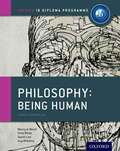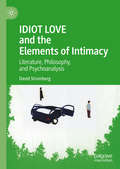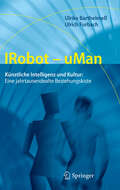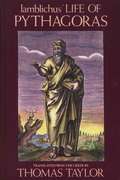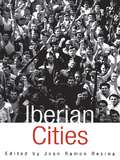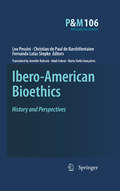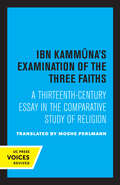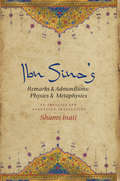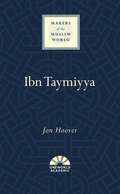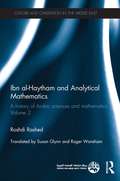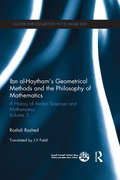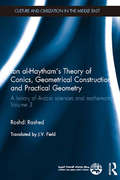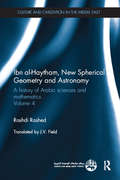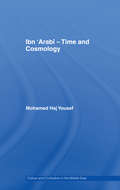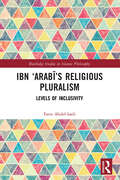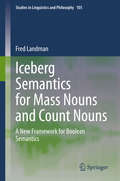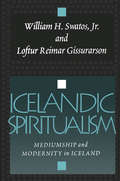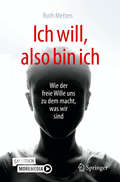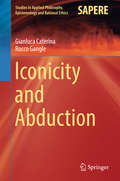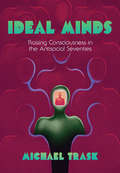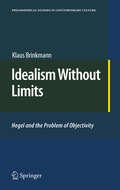- Table View
- List View
IB Philosophy: Being Human Course Book (Oxford IB Diploma Program)
by Daniel Lee Guy Williams Chris White Nancy Le NezetDeveloped directly with the IB, dedicated assessment support straight from the IB builds confidence, and student samples drive critical thought on constructing strong responses. The most comprehensive coverage of the core content Being Human, this course book will help learners grasp complex philosophical ideas and develop crucial thinking skills <p>• The most comprehensive coverage of the core content Being Human, developed directly with the IB <p>• Engage learners in the course, with excerpts from a range of philosophers spurring critical discussion <p>• Help students understand exam achievement levels and progress attainment with clear student samples <p>• Assessment support straight from the IB cements assessment potential <p>• Support all learning styles and simplify complex philosophical ideas using clear visuals and illustrations <p>• Reinforce all key ideas with integrated activities helping extend and deepen understanding <p><p>IB Diploma Course Books are essential resource materials designed in cooperation with the IB to provide students with extra support through their IB studies. Course Books provide advice and guidance on specific course assessment requirements, mirroring the IB philosophy and providing opportunities for critical thinking.
IDIOT LOVE and the Elements of Intimacy: Literature, Philosophy, and Psychoanalysis
by David StrombergThis book turns our search for intimacy on its head, suggesting that our way to creativity in love may be through idiocy. The book takes its readers on a journey through the work of Plato and Melanie Klein in theorizing the dynamics of intimacy while exploring some of the paradoxical aspects of love in works by Fyodor Dostoevsky and French filmmaker Catherine Breillat. Revisiting core concepts of how we think about relationships, the book lays out a model for relational breakdown—the idiot lovecycle—in which we are constantly in the flux between seeing ourselves and seeing the other. Effecting close readings of literary, philosophical, and psychoanalytical sources, the book draws on parallels between these fields of inquiry while tracing their shared intellectual genealogy, suggesting that the tension between Narcissus and Cassandra, with its inherent conflicts, is also the space through which love emerges from intimacy.
IEA International Civic and Citizenship Education Study 2022 Assessment Framework
by Julian Fraillon John Ainley Wolfram Schulz Tim Friedman Bruno Losito Gabriella Agrusti Valeria DamianiThis open access publication outlines the underlying framework for gathering data on civic knowledge, attitudes, and engagement as well as contextual information, and it describes the assessment design for the International Association for the Evaluation of Educational Achievement’s (IEA) International Civic and Citizenship Education Study 2022.The IEA International Civic and Citizenship Study (ICCS) investigates how young people are prepared to undertake their roles as citizens in a range of countries in the second decade of the 21st century. ICCS 2022 is a continuation of two earlier IEA studies, ICCS 2009 and ICCS 2016, and, for the first time, this survey includes the option of a computer-based assessment. Responding to enduring and emerging challenges of educating young people in a world where contexts of democracy and civic participation continue to change, the study addresses issues related to young people’s engagement through digital technologies, migration and diversity, perceptions of the political system, global citizenship, and education for sustainable development. Over the past 50 years, IEA has conducted comparative research studies in a range of domains focusing on educational policies, practices, and outcomes in many countries around the world. Prior to ICCS 2022, IEA conducted four international comparative studies of civic and citizenship education, with a first survey implemented in 1971, a second one in 1999, third in 2009 and fourth in 2016. ICCS 2022 data will allow education systems to evaluate the strengths of educational policies, both internationally, and in a regional context, and to measure progress in achieving critical components of their educational policy agendas.
IRobot - uMan
by Ulrich Furbach Ulrike BarthelmeßWarum werden Roboter oft als bedrohlich empfunden? Können künstliche Systeme Emotionen und Bewusstsein haben? Die Autoren gehen von der These aus, dass die Literatur- und Geistesgeschichte uns helfen kann, aktuelle Entwicklungen der Robotik unvoreingenommen zu betrachten. Denn ob es um mittelalterliche Mythen, androide Roboter der Romantik, die Aufklärung oder die Entwicklung der künstlichen Intelligenz geht, stets stellt sich die Frage nach dem, was der Mensch ist, was sein Bewusstsein ausmacht und was ihn von anderen Wesen unterscheidet.
Iamblichus' Life of Pythagoras
by Thomas TaylorAuthentic memoirs of the life of Pythagoras--the father of philosophy and the inventor of geometry--hold the great interest for every lover of wisdom. Iamblichus' biography is universally acknowledged as deriving from sources of the highest antiquity. Its classic translation by Thomas Taylor was first printed in 1818 and is once again brought to light in this edition. During Iamblichus' life, the depth and sublimity of his writing and discourse attracted a multitude of associates and disciples from all parts of the world. The Emperor Julian wrote of him, "that he was posterior indeed in time, but not in genius, to Plato," and all the Platonists who succeeded him honored him with the epithet of "divine." Iamblichus' account of the life of Pythagoras begins with the great philosopher's birth on the island of Samos, his youth, and his wide renown in Greece. It briefly covers his early travels and his studies with the philosophers Anaximander and Thales, his twenty-two years of instruction in the temples of Egypt, and his initiation into the Egyptian and Babylonian mysteries. The later life and work of Pythagoras are richly elaborated, with humorous and profound anecdotes illustrating his philosophy and providing a unique view of community life under his tutelage in Crotona. Included are excerpts from his teachings on harmonic science, dietetic medicine, friendship, temperance, politics, parenthood, the soul's former lives and many other topics. The book also contains substantial sections on the Fragments of the Ethical Writings (the work of very early Pythagoreans) and the Pythagoric Sentences.
Iberian Cities (Hispanic Issues #Vol. 22)
by Joan Ramon ResinaThis multi-disciplinary study explores the explosion of cultural, social, linguistic, and architectural development in urban and rural settlements on and surrounding the Iberian peninsula during the 20th century.
Ibero-American Bioethics
by Adail Sobral Maria Stella Gonçalves Fernando Lolas Stepke Jennifer Bulcock Christian de Paul de Barchifontaine Léo PessiniThis volume is the first English-language book-length text to trace the development of bioethics in the Ibero-American context. Coverage is given to many particular countries within Latin America with an aim to present the historical development of bioethics therein. This history takes place against the backdrop of a tumultuous period of time in the history of Latin America. The volume also discusses the relationship of bioethics in Latin America to questions and issues in Roman Catholic moral theology and philosophy. Moreover, it specifically touches on how these issues affect women in the region. "Ibero-American Bioethics: History and Perspectives" is a landmark work, collecting the voices of those who participated in the founding and development of bioethics in Latin America, the Caribbean, and the Iberian Peninsula. The volume offers the reader a cluster of perspectives on the various births of bioethics in this region. The essays in part are irreplaceable first-person voices that give an account of how bioethics took shape within the Spanish and Portuguese cultures both in Europe and in the Americas. As such, the volume is a collection of primary sources, otherwise not available in English, that presents historical panoramas and explores the new perspectives born of the different phases of bioethics in Ibero-America - from its assimilation of bioethics to its creation of its own authentic voices. The volume also encompasses critical reflections from this region on the quite different ways in which its local bioethics have taken shape. As such, this volume also offers an introduction into the quite different concerns that frame and direct bioethics in the cultural context of Ibero-America. The book gives a rich, deep, broad, and pluralist presentation of Ibero-American bioethics and its contribution to the international phenomenon of bioethics. It is a volume for all readers interested in bioethics, Ibero-American studies, and international approaches to health care policy.
Ibn Gabirol's Theology of Desire
by Sarah PessinDrawing on Arabic passages from Ibn Gabirol's original Fons Vitae text, and highlighting philosophical insights from his Hebrew poetry, Sarah Pessin develops a "Theology of Desire" at the heart of Ibn Gabirol's eleventh-century cosmo-ontology. She challenges centuries of received scholarship on his work, including his so-called Doctrine of Divine Will. Pessin rejects voluntarist readings of the Fons Vitae as opposing divine emanation. She also emphasizes Pseudo-Empedoclean notions of "Divine Desire" and "Grounding Element" alongside Ibn Gabirol's use of a particularly Neoplatonic method with apophatic (and what she terms "doubly apophatic") implications. In this way, Pessin reads claims about matter and God as insights about love, desire, and the receptive, dependent, and fragile nature of human being. Pessin reenvisions the entire spirit of Ibn Gabirol's philosophy, moving us from a set of doctrines to a fluid inquiry into the nature of God and human being - and the bond between God and human being in desire.
Ibn Kammuna's Examination of the Three Faiths: A Thirteenth-Century Essay in the Comparative Study of Religion
by Moshe PerlmannThis title is part of UC Press's Voices Revived program, which commemorates University of California Press’s mission to seek out and cultivate the brightest minds and give them voice, reach, and impact. Drawing on a backlist dating to 1893, Voices Revived makes high-quality, peer-reviewed scholarship accessible once again using print-on-demand technology. This title was originally published in 1971.
Ibn Sina's Remarks and Admonitions: Physics and Metaphysics
by Shams C. InatiAl-Isharat wat-Tanbihat ( Remarks and Admonitions) is one of the most mature and comprehensive philosophical works of Ibn Sina (Avicenna, 980--1037). Grounded in an exploration of logic (which Ibn Sina described as the gate to knowledge) and happiness (the ultimate human goal), the text illuminates the divine, the human being, and the nature of things through a wide-ranging discussion of topics. The sections of Physics and Metaphysics deal with the nature of bodies and souls as well as existence, creation, and knowledge. Especially important are Ibn Sina's views of God's knowledge of particulars, which generated much controversy in medieval Islamic and Christian philosophical and theological circles and provoked a strong rejection by eleventh-century philosopher al-Ghazali.This book provides the first annotated English translation of Physics and Metaphysics and edits the original Arabic text on which the translation is based where it is corrupt or incomprehensible. It begins with a detailed analysis of the text, followed by a translation of the three classes or groups of ideas in the Physics (On the Substance of Bodies; On the Directions and Their Primary and Secondary Bodies; and On the Terrestrial and Celestial Souls) and the four in the Metaphysics (On Existence and Its Causes; Creation Ex Nihilo and Immediate Creation; On Ends, on Their Principles, and on the Arrangement [of Existence]; and On Abstraction. The Metaphysics closes with a significant discussion of the concepts of providence, good, and evil, which Ibn Sina uses to introduce a theodicy.Researchers, faculty, and students in philosophy, theology, religion, and intellectual history will find in this work a useful and necessary source for understanding Ibn Sina's philosophical thought and more generally the medieval Islamic and Christian study of nature, the world beyond, psychology, God, and the concept of evil.
Ibn Sina’s Remarks and Admonitions: An Analysis and Annotated Translation
by Shams C. InatiAl-Isharat wal-Tanbihat (Remarks and Admonitions) is one of the most mature and comprehensive philosophical works by Ibn Sina (Avicenna, 980–1037). Grounded in an exploration of logic (which Ibn Sina described as the gate to knowledge) and happiness (the ultimate human goal), the text illuminates the divine, the human being, and the nature of things through a wide-ranging discussion of topics. The sections of Physics and Metaphysics deal with the nature of bodies and souls as well as existence, creation, and knowledge. Especially important are Ibn Sina's views of God's knowledge of particulars, which generated much controversy in medieval Islamic and Christian philosophical and theological circles and provoked a strong rejection by eleventh-century philosopher al-Ghazali.This book provides the first annotated English translation of Physics and Metaphysics and edits the original Arabic text on which the translation is based. It begins with a detailed analysis of the text, followed by a translation of the three classes or groups of ideas in the Physics (On the Substance of Bodies, On the Directions and Their Primary and Secondary Bodies, and On the Terrestrial and Celestial Souls) and the four in the Metaphysics (On Existence and Its Causes, Creation Ex Nihilo and Immediate Creation, On Ends, on Their Principles, and on the Arrangement [of Existence], and On Abstraction. The Metaphysics closes with a significant discussion of the concepts of providence, good, and evil, which Ibn Sina uses to introduce a theodicy.Researchers, faculty, and students in philosophy, theology, religion, and intellectual history will find in this work a useful and necessary source for understanding Ibn Sina's philosophical thought and, more generally, the medieval Islamic and Christian study of nature, the world beyond, psychology, God, and the concept of evil.
Ibn Taymiyya (Makers of the Muslim World #73)
by Jon HooverIbn Taymiyya (1263–1328) of Damascus was one of the most prominent and controversial religious scholars of medieval Islam. He called for jihad against the Mongol invaders of Syria, appealed to the foundational sources of Islam for reform, and battled against religious innovation. Today, he inspires such diverse movements as Global Salafism, Islamic revivalism and modernism, and violent jihadism. This volume synthesizes the latest research, discusses many little-known aspects of Ibn Taymiyya&’s thought, and highlights the religious utilitarianism that pervades his activism, ethics, and theology.
Ibn Tufayl's Hayy Ibn Yaqzan: A Philosophical Tale
by Ibn Tufayl Lenn Evan GoodmanThe Arabic philosophical fable Hayy Ibn Yaqzanis a classic of medieval Islamic philosophy. Ibn Tufayl (d. 1185), the Andalusian philosopher, tells of a child raised by a doe on an equatorial island who grows up to discover the truth about the world and his own place in it, unaided--but also unimpeded--by society, language, or tradition. Hayy's discoveries about God, nature, and man challenge the values of the culture in which the tale was written as well as those of every contemporary society. Goodman's commentary placesHayy Ibn Yaqzanin its historical and philosophical context. The volume features a new preface and index, and an updated bibliography. "One of the most remarkable books of the Middle Ages. "--Times Literary Supplement "An enchanting and puzzling story. . . . The book transcends all historical and cultural environments to settle upon the questions of human life that perpetually intrigue men. "--Middle EastJournal "Goodman has done a service to the modern English reader by providing a readable translation of a philosophically significant allegory. "--Philosophy East and West "Add[s] bright new pieces to an Islamic mosaic whose general shape is already known. "--American Historical Review
Ibn al-Haytham and Analytical Mathematics: A History of Arabic Sciences and Mathematics Volume 2 (Culture and Civilization in the Middle East)
by Roshdi RashedThis volume provides a unique primary source on the history and philosophy of mathematics and the exact sciences in the mediaeval Arab world. The second of five comprehensive volumes, this book offers a detailed exploration of Arabic mathematics in the eleventh century as embodied in the legacy of the celebrated polymath al-Hasan ibn al-Haytham. Extensive analyses and annotations from the eminent scholar, Roshdi Rashed, support a number of key Arabic texts from Ibn al-Haytham’s treatises in infinitesimal mathematics, translated here into English for the first time. Rashed shows how Ibn al-Haytham’s works demonstrate a remarkable mathematical competence in mathematical subjects like the quadrature of the circle and of lunes, the calculation of the volumes of paraboloids, the problem of isoperimetric plane figures and solid figures with equal surface areas, along with the extraction of square and cubic roots. The present text is complemented by the first volume of A History of Arabic Sciences and Mathematics, which focused on founding figures and commentators in the ninth and tenth centuries Archimedean-Apollonian mathematical ‘School of Baghdad’. This constellation of works illustrates the historical and epistemological development of ‘infinitesimal mathematics’ as it became clearly articulated in the oeuvre of Ibn al-Haytham. Contributing to a more informed and balanced understanding of the internal currents of the history of mathematics and the exact sciences in Islam, and of its adaptive interpretation and assimilation in the European context, this fundamental text will appeal to historians of ideas, epistemologists and mathematicians at the most advanced levels of research.
Ibn al-Haytham's Geometrical Methods and the Philosophy of Mathematics: A History of Arabic Sciences and Mathematics Volume 5 (Culture and Civilization in the Middle East)
by Roshdi Rashed and J. V. FieldThis fifth volume of A History of Arabic Sciences and Mathematics is complemented by four preceding volumes which focused on the main chapters of classical mathematics: infinitesimal geometry, theory of conics and its applications, spherical geometry, mathematical astronomy, etc. This book includes seven main works of Ibn al-Haytham (Alhazen) and of two of his predecessors, Thābit ibn Qurra and al-Sijzī: The circle, its transformations and its properties; Analysis and synthesis: the founding of analytical art; A new mathematical discipline: the Knowns; The geometrisation of place; Analysis and synthesis: examples of the geometry of triangles; Axiomatic method and invention: Thābit ibn Qurra; The idea of an Ars Inveniendi: al-Sijzī. Including extensive commentary from one of the world’s foremost authorities on the subject, this fundamental text is essential reading for historians and mathematicians at the most advanced levels of research.
Ibn al-Haytham's Theory of Conics, Geometrical Constructions and Practical Geometry: A History of Arabic Sciences and Mathematics Volume 3 (Culture and Civilization in the Middle East)
by Roshdi RashedTheory of Conics, Geometrical Constructions and Practical Geometry: A History of Arabic Sciences and Mathematics Volume 3, provides a unique primary source on the history and philosophy of mathematics and science from the mediaeval Arab world. The present text is complemented by two preceding volumes of A History of Arabic Sciences and Mathematics, which focused on founding figures and commentators in the ninth and tenth centuries, and the historical and epistemological development of ‘infinitesimal mathematics’ as it became clearly articulated in the oeuvre of Ibn al-Haytham. This volume examines the increasing tendency, after the ninth century, to explain mathematical problems inherited from Greek times using the theory of conics. Roshdi Rashed argues that Ibn al-Haytham completes the transformation of this ‘area of activity,’ into a part of geometry concerned with geometrical constructions, dealing not only with the metrical properties of conic sections but with ways of drawing them and properties of their position and shape. Including extensive commentary from one of world’s foremost authorities on the subject, this book contributes a more informed and balanced understanding of the internal currents of the history of mathematics and the exact sciences in Islam, and of its adaptive interpretation and assimilation in the European context. This fundamental text will appeal to historians of ideas, epistemologists and mathematicians at the most advanced levels of research.
Ibn al-Haytham, New Astronomy and Spherical Geometry: A History of Arabic Sciences and Mathematics Volume 4 (Culture and Civilization in the Middle East)
by Roshdi RashedThis volume provides a unique primary source on the history and philosophy of mathematics and science from the mediaeval Arab world. The fourth volume of A History of Arabic Sciences and Mathematics is complemented by three preceding volumes which focused on infinitesimal determinations and other chapters of classical mathematics. This book includes five main works of the polymath Ibn al-Haytham (Alhazen) on astronomy, spherical geometry and trigonometry, plane trigonometry and studies of astronomical instruments on hour lines, horizontal sundials and compasses for great circles. In particular, volume four examines: the increasing tendency to mathematize the inherited astronomy from Greek sources, namely Ptolemy's Almagest; the development of celestial kinematics; new research in spherical geometry and trigonometry required by the new kinematical theory; the study on astronomical instruments and its impact on mathematical research. These new historical materials and their mathematical and historical commentaries contribute to rewriting the history of mathematical astronomy and mathematics from the 11th century on. Including extensive commentary from one of the world’s foremost authorities on the subject, this fundamental text is essential reading for historians and mathematicians at the most advanced levels of research.
Ibn ‘Arabî - Time and Cosmology (Culture and Civilization in the Middle East)
by Mohamed Haj YousefThis book is the first comprehensive attempt to explain Ibn ‘Arabî’s distinctive view of time and its role in the process of creating the cosmos and its relation with the Creator. By comparing this original view with modern theories of physics and cosmology, Mohamed Haj Yousef constructs a new cosmological model that may deepen and extend our understanding of the world, while potentially solving some of the drawbacks in the current models such as the historical Zeno's paradoxes of motion and the recent Einstein-Podolsky-Rosen paradox (EPR) that underlines the discrepancies between Quantum Mechanics and Relativity.
Ibn ‘Arabī’s Religious Pluralism: Levels of Inclusivity (Routledge Studies in Islamic Philosophy)
by Faris Abdel-hadiThis book marks a significant contribution to the debate around Ibn ʿArabī’s religious pluralism, focusing on his multifaceted approach to non-Abrahamic religions.For nearly eight hundred years, the writings and ideas of the great Spanish Sufi master Ibn ʿArabī have shaped Islamic intellectual and spiritual culture, from North and West Africa and France on the one hand, to Iran, the Levant, Central Asia, and the Far East on the other. Modern scholarship on the “Greatest Master” is consequently at an all-time high. This book weighs in on a well-known aspect of his religious worldview, namely his perspective on religious pluralism, but does so from an entirely different angle. Offering a very close reading of his major works, newly translated by the author, and paying particular attention to a highly developed celestial metaphor prompted by his encounter with a group of pagan sun-worshippers, the book offers new insights into the nature and scope of Ibn ʿArabī’s understanding of Islamic inclusivism. Ultimately, the book contributes to our understanding of both interfaith dialogue and the history of world religions through the prism of Ibn ʿArabī’s work.The book will be of particular interest to students and scholars working in a range of fields, including Islamic philosophy, Sufism, and intellectual history.
Iceberg Semantics for Mass Nouns and Count Nouns: A New Framework for Boolean Semantics (Studies in Linguistics and Philosophy #105)
by Fred LandmanIceberg semantics is a new framework of Boolean semantics for mass nouns and count nouns in which the interpretation of a noun phrase rises up from a generating base and floats with its base on its Boolean part set, like an iceberg. The framework is shown to preserve the attractive features of classical Boolean semantics for count nouns; the book argues that Iceberg semantics forms a much better framework for studying mass nouns than the classical theory does. Iceberg semantics uses its notion of base to develop a semantic theory of the differences between mass nouns and count nouns and between different types of mass nouns, in particular between prototypical mass nouns (here called mess mass nouns) like water and mud versus object mass nouns (here called neat mass nouns) like poultry and pottery. The book shows in detail how and why neat mass nouns pattern semantically both with mess mass nouns and with count nouns. Iceberg semantics is a compositional theory and in Iceberg semantics the semantic distinctions defined apply to noun phrases of any complexity. The book studies in depth the semantics of classifier noun phrases (like three glasses of wine) and measure noun phrases (like three liters of wine). The classical wisdom is that classifier interpretations are count. Recent literature has argued compellingly that measure interpretations are mass. The book shows that both connections follow from the basic architecture of Iceberg semantics.Audience: Scholars and students in linguistics - in particular semantics, pragmatics, computational linguistics and syntax – and neighbouring disciplines like logic, philosophy of language, and cognitive science.
Icelandic Spiritualism: Mediumship and Modernity in Iceland
by Loftur Reimar GissurarsonIcelandic Spiritualism is an engaging social anthropological study of the place of spiritualism in Icelandic church and society during the first half of the twentieth century. Challenging standard theoretical approaches to the study of religion, the book contributes a wealth of data on the history of religion and psychical research, presenting it in a vivid descriptive narrative.The authors trace the role of the spirit world in Icelandic culture, giving particular attention to the distinctive history of Iceland's "conversion" to Christianity. They focus on the appearance of "modern" spiritualism as a distinct phenomenon in Icelandic life. The book studies the interaction between various groups in fin-de-siecle Icelandic society, not least in the state church, as mediumistic phenomena became widely reported through the newspapers.To some, Icelandic spiritualism may be considered a deviant case of Protestantism. What makes this book interesting, however, is that the spiritualism is seen as integral to Iceland's transition to modernity. While Icelandic Spiritualism concentrates mainly on the first half of the twentieth century, it also provides a summary of the continuation of spiritualist phenomena up to the current period. This intriguing study will be of interest to theologians, philosophers, sociologists, psychologists, and anthropologists.
Ich will, also bin ich: Wie der freie Wille uns zu dem macht, was wir sind
by Ruth MettenDieses Buch appelliert an Sie, Ihren freien Willen zu gebrauchen. Denn allen wissenschaftlichen Unkenrufen zum Trotz: wir haben – wie gezeigt wird – tatsächlich einen freien Willen; wir haben einen Zugriff auf unsere Freiheit. Das ist sogar von allerhöchster Bedeutung: denn unser Selbst scheint erst durch Willensakte zustande zu kommen. Verhält es sich aber so, dann täten wir gut daran, unseren Willen zu bilden, wie es die alten Meditationsschulen empfehlen. Und wodurch gelingt das? Indem wir uns in Achtsamkeit und Selbsthypnose üben, wozu der letzte Teil des Buches anleiten will. Mit einem Geleitwort von Dr. Burkhard Peter. Aus dem Inhalt: Der freie Wille – eine Illusion? – Leben gedeiht in Freiheit – Rückschläge – Mit vielen Beispielen, Übungen und Aha-Momenten. Mit Hörübungen zum Download. Über die Autorin: Dr. med. Ruth Metten ist als Fachärztin für Psychiatrie und Psychotherapie in Kempen niedergelassen, beschäftigt sich mit Sterbebegleitung, Achtsamkeit und Selbsthypnose und hält zum Thema dieses Buches Vorträge und Seminare.
Iconicity and Abduction
by Rocco Gangle Gianluca CaterinaThis book consolidates and extends the authors work on the connection between iconicity and abductive inference. It emphasizes a pragmatic, experimental and fallibilist view of knowledge without sacrificing formal rigor. Within this context, the book focuses particularly on scientific knowledge and its prevalent use of mathematics. To find an answer to the question What kind of experimental activity is the scientific employment of mathematics? the book addresses the problems involved in formalizing abductive cognition. For this, it implements the concept and method of iconicity, modeling this theoretical framework mathematically through category theory and topoi. Peirce's concept of iconic signs is treated in depth, and it is shown how Peirce's diagrammatic logical notation of Existential Graphs makes use of iconicity and how important features of this iconicity are representable within category theory. Alain Badiou s set-theoretical model of truth procedures and his relational sheaf-based theory of phenomenology are then integrated within the Peircean logical context. Finally, the book opens the path towards a more naturalist interpretation of the abductive models developed in Peirce and Badiou through an analysis of several recent attempts to reformulate quantum mechanics with categorical methods. Overall, the book offers a comprehensive and rigorous overview of past approaches to iconic semiotics and abduction, and it encompasses new extensions of these methods towards an innovative naturalist interpretation of abductive reasoning. "
Ideal Minds: Raising Consciousness in the Antisocial Seventies
by Michael TraskFollowing the 1960s, that decade's focus on consciousness-raising transformed into an array of intellectual projects far afield of movement politics. The mind's powers came to preoccupy a range of thinkers and writers: ethicists pursuing contractual theories of justice, radical ecologists interested in the paleolithic brain, seventies cultists, and the devout of both evangelical and New Age persuasions. In Ideal Minds, Michael Trask presents a boldly revisionist argument about the revival of subjectivity in postmodern American culture, connecting familiar figures within the seventies intellectual landscape who share a commitment to what he calls "neo-idealism" as a weapon in the struggle against discredited materialist and behaviorist worldviews.In a heterodox intellectual and literary history of the 1970s, Ideal Minds mixes ideas from cognitive science, philosophy of mind, moral philosophy, deep ecology, political theory, science fiction, neoclassical economics, and the sociology of religion. Trask also delves into the decade's more esoteric branches of learning, including Scientology, anarchist theory, rapture prophesies, psychic channeling, and neo-Malthusianism. Through this investigation, Trask argues that a dramatic inflation in the value of consciousness and autonomy beginning in the 1970s accompanied a growing argument about the state's inability to safeguard such values. Ultimately, the thinkers Trask analyzes—John Rawls, Arne Naess, L. Ron Hubbard, Hal Lindsey, Philip Dick, Ursula Le Guin, Edward Abbey, William Burroughs, John Irving, and James Merrill—found alternatives to statism in conditions that would lend intellectual support to the consolidation of these concepts in the radical free market ideologies of the 1980s.
Idealism Without Limits
by Klaus BrinkmannIn this study of Hegel's philosophy, Brinkmann undertakes to defend Hegel's claim to objective knowledge by bringing out the transcendental strategy underlying Hegel's argument in the Phenomenology of Spirit and the Logic. Hegel's metaphysical commitments are shown to become moot through this transcendental reading. Starting with a survey of current debates about the possibility of objective knowledge, the book next turns to the original formulation of the transcendental argument in favor of a priori knowledge in Kant's First Critique. Through a close reading of Kant's Transcendental Deduction and Hegel's critique of it, Brinkmann tries to show that Hegel develops an immanent critique of Kant's position that informs his reformulation of the transcendental project in the Introduction to the Phenomenology of Spirit and the formulation of the position of 'objective thought' in the Science of Logic and the Encyclopedia of the Philosophical Sciences. Brinkmann takes the reader through the strategic junctures of the argument of the Phenomenology that establishes the position of objective thinking with which the Logic begins. A critical examination of the Introduction to the Lectures on the History of Philosophy shows that Hegel's metaphysical doctrine of the self-externalization of spirit need not compromise the ontological project of the Logic and thus does not burden the position of objective thought with pre-critical metaphysical claims. Brinkmann's book is a remarkable achievement. He has given us what may be the definitive version of the transcendental, categorial interpretation of Hegel. He does this in a clear approachable style punctuated with a dry wit, and he fearlessly takes on the arguments and texts that are the most problematic for this interpretation. Throughout the book, he situates Hegel firmly in his own context and that of contemporary discussion." -Terry P. Pinkard, University Professor, Georgetown University, Washington, D.C, USA "Klaus Brinkmann's important Hegel study reads the Phenomenology and the Logic as aspects of a single sustained effort, in turning from categories to concepts, to carry Kant's Copernican turn beyond the critical philosophy in what constitutes a major challenge to contemporary Cartesianism." - Tom Rockmore, McAnulty College Distinguished Professor, Duquesne University, Pittsburgh, Pennsylvania, USA "In this compelling reconstruction of the theme of objective thought, Klaus Brinkmann takes the reader through Hegel's dialectic with exceptional philosophical acumen.... Many aspects of this book are striking: the complete mastery of the central tenets of Kant's and Hegel's philosophy, the admirable clarity in treating obscure texts and very difficult problems, and how Brinkmann uses his expertise for a discussion of the problems of truth, objectivity and normativity relevant to the contemporary philosophical debate. This will prove to be a very important book, one that every serious student of Kant and Hegel will have to read." - Alfredo Ferrarin, Professor, Department of Philosophy, University of Pisa, Pisa, Italy
